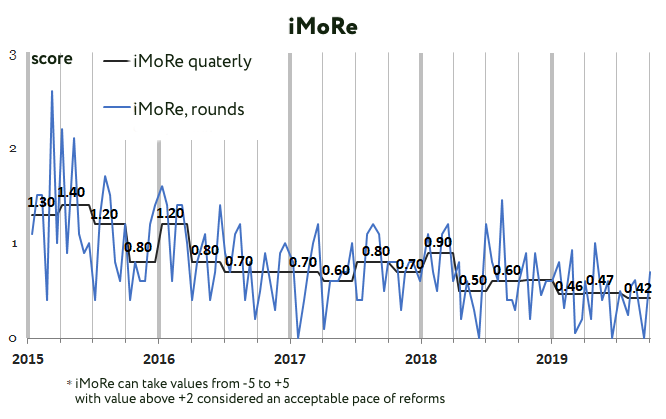Since early 2015 VoxUkraine performs a bi-weekly assessment of the pace of economic reforms in Ukraine. Quarterly reviews provide a ‘helicopter view’ on developments of the previous three months. During the third quarter of 2019 the pace of reforms continued to slow down for the sixth quarter in a row.
During the third quarter (July-September 2019) Ukraine has seen a complete reload of the government. These were the final days of the Groysman government and the very start of the new one headed by Honcharuk. During summer 2019, the index hit zero for the fourth time in its history. The average value of Reform Index went down from +0.47 in the second quarter to +0.42 in the third quarter. During Q3, 26 reformist changes to legislation were adopted, most of them after the start of the new government.
The most significant legislative changes concerned customs, social welfare and telecom. The Cabinet of Ministers initiated 8 regulations, the Parliament – 15, and the NBU – 3. An anti-reform has been detected in the Business Environment – allowing labour inspection to visit enterprises without a warning to check whether they adhere to the Labour Code (#Reform Index 116) received negative evaluations from Reform Index experts.
Last summer, the NBU cancelled the obligation to comply with instant and current liquidity ratio requirements and allowed post offices to transfer money of their customers without a bank account.
In the last two weeks of September, when the new parliament entered the ‘turbo-mode’, several important laws were adopted that were suspended by the previous Rada. Reform Index experts provided high grades to the introduction of the national electronic transit system, to lowering the workload on the judges of the Higher Anti-Corruption Court (which allowed HACC to start operating), and to cancelation of licensing of telecommunication operators. The president is expected to sign a lot of recently adopted bills, that will impact Reform Index dynamics in the last quarter of the year. We do hope that the pace of reform will accelerate and perhaps even exceed its early 2015 maximum.
In the second quarter Reform Index average was +0.47 points driven by 9 reformist changes to legislation. The Cabinet of Ministers initiated 6 regulations, the Parliament – 2, the President and the NBU – one each.
The main legislative changes within the last three months are as follows:
1. Introduction of an electronic transit system at the customs offices, +2.5 points (Reform Index #118)
What was the problem?
Ukraine wants to join the common transit procedure which allows exporters from 35 countries to transport goods with minimal formalities. Under this system, a cargo carrier can cross any borders between these countries with a single customs declaration. To that end, we need to introduce the IT product installed by all the 35 countries using the common transit procedure (New Computerised Transit System – NCTS) at customs offices.
What has changed?
Law 78-IX of September 12, 2019 regulates introduction of the NCTS. It will enable Ukraine to exchange customs information with other countries that have this system in place and obtain the information required for transferring goods. This IT product must be used in Ukraine for one year before the country becomes eligible for receiving an invitation to enter the common system.
2. Alleviating the workload on the judges of the Anti-Corruption Court, +2.0 points (Reform Index #118)
What was the problem?
The Law on the HACC providing a detailed description of organization and functioning of the Court was adopted by the Parliament and signed by the President in June 2018 (receiving +5.0 points from Reform Index experts, see Reform Index #87). The Court includes 38 judges; of these, 27 are first instance court judges and 11 are judges of the appellate chamber.
When the Court began operating, it turned out that the workload on the judges was too high, preventing them from considering top corruption cases effectively. On average, one judge had to consider about 100 cases at the same time.
What has changed?
Law 100-IX of September 18, 2019 resolves this problem. HACC will only consider top corrupt officials’ cases previously investigated by the National Anti-Corruption Bureau and Specialized AC prosecution. The judges’ workload will be reduced to 10-12 cases.
3. New standards of emergency medical care, +2.0 points (Reform Index #116)
What was the problem?
Emergency medical care is ineffective today. In particular, in 2016, only 8.5% of reanimations by emergency brigades for patients with cardiac arrest were successful and led to resumed spontaneous blood circulation (in European countries, on average – 29%).
Emergency healthcare reform implies new requirements for an emergency brigade, introduction of a modern dispatching system and car fleet upgrade.
What has changed?
CMU decree No. 764 of August 21, 2019 introduces new requirements for emergency brigades. Each brigade will include at least one paramedic and one emergency medical technician. The task of paramedics is to provide a patient with the full amount of pre-hospital emergency medical care and to transport him/her to the hospital in a timely manner. The task of an emergency medical technician is to assist paramedics and doctors of the brigade. These specialists do not need higher medical education. Ambulance drivers will go through special training enabling them to perform these duties.
The pilot project is being implemented since 2019 in Vinnitska, Donetska, Odeska, Poltavska, Ternopilska oblast and in Kyiv. To learn more about the reform, please watch the video
4. Canceling licensing of telecommunication operators, +2.0 points (Reform Index #118)
What was the problem?
The Law on licensing 222-VIII of March 2, 2015, canceled licensing of telecommunication operators starting January 1, 2018. But this led to a legislative collision. According to the Law on telecommunications No 1280-IV of November 18, 2003, the license was still required.
What has changed?
The law 102-IX of September 18, 2019, harmonized the provisions of the above laws. From now on, before starting to provide telecommunication services an operator will only have to notify the regulator (NCSRCI) of its intention.
5. “Money follows the teacher” principle to improve teachers skills, +2.0 points (Reform Index #116)
What was the problem?
To confirm or upgrade their qualification level (on which teachers’ salary partly depends), teachers had to complete a state-funded training at least once per 5 years. Trainings have been organized by Soviet-style institutes and took at least a month. Often, the course material would be outdated and unhelpful for a teacher. The Framework Law on Education suggests that a teacher can choose a course themselves, and the state will pay for it. However, there was no mechanism for the practical implementation of this principle.
What has changed?
Now the teacher will be able to choose how and where he / she will study as long as the course is approved by a school pedagogical council. Teachers can take courses, including online courses, internships, attend workshops, seminars etc. The total length of study should be at least 150 hours over 5 years.
6. Money transfer services by Post offices +2.0 points (Reform Index #115)
What was the problem?
Postal operators can offer their clients money transfer services. However, to comply with the legislation they had to register a separate financial company.
What has changed?
With the Resolution №98 of July 22, 2019, the NBU allows postal companies to make transfers without opening a bank account. However, they should obtain a licence from the NBU to do that.

Attention
The author doesn`t work for, consult to, own shares in or receive funding from any company or organization that would benefit from this article, and have no relevant affiliations



